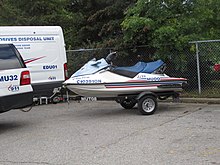Sea Doo Jet Ski Spark Top Speed
 Toronto Police rescue unit. | |
| Product type | Personal watercraft |
|---|---|
| Produced by | Bombardier Recreational Products |
| Country | Canada |
| Introduced | 1968 |
| Related brands | Sea-Doo XP |
| Markets | Worldwide |
| Website | www |
Sea-Doo is a Canadian brand of personal watercraft (PWC) and boats manufactured by Bombardier Recreational Products (BRP).[1] [2] All Sea-Doo models are driven by an impeller-driven waterjet.[3] [4] All Sea-Doo PWC models are currently produced in BRP's plants in Querétaro and Juárez, Mexico. Its Rotax engines are produced at BRP's plant in Gunskirchen, Austria.[5] In 2016, Sea-Doo had a 45.8% market share among PWC brands.[6]
History [edit]

1992 SeaDoo XP generation one, the original high performance runabout style PWC.
Bombardier introduced its first personal watercraft in 1968, called the Bombardier Sea-Doo. It was designed and mentored by Clayton Jacobson II, who would later develop the more successful Kawasaki Jet Ski watercraft.[7] Also heavily involved was Bombardier's Laurent Beaudoin, who was interested in expanding the success of the Ski-Doo snowmobile to the water. Marketed as the "Jet-powered Aqua Scooter",[8] the original yellow Sea-Doo was 5 feet wide and 7.5 feet long, somewhat resembling a flying saucer. For 1968, it was powered by an air-cooled, 320cc engine with a top speed of 25 mph. Following complaints of overheating and inefficiency, it was replaced for 1969 with a water cooled 367cc engine.[9] There were common complaints about discomfort from its flat seat and minimally-padded Ski-Doo supplied stainless steel handle bars. After only two years on the market, it was discontinued.[10]
The Sea-Doo was re-introduced in 1988 as its own brand under Bombardier, signaling a turnaround in the company's declining fortunes.[1] Annual sales for the Sea-Doo were over 100,000 units in the 1995 fiscal year, at which point the company had captured over half of the personal watercraft market. In 1997 the company earned $212 million on the Sea-Doo.[1] [11] [12]
Models [edit]
There are five categories of Sea-Doo models: Recreation, Tow Sports, Touring, Sport Fishing, and Performance.[13]
The Sea-Doo jet-powered sport boats included a four-seater Sportster 150 with 155 hp or 215 hp, a four-seater Speedster 150 with 255 hp, a seven-seater Speedster 200 with 310 hp, and a Speedster 230 with space for up to twelve persons. The Wake 200 model was made for wakeboarding and two Challenger models were less sporty and more luxurious: a smaller Challenger 180 and a larger Challenger 210. In 2012, BRP discontinued the sport boat production citing a decline in global sales in the marine industry. This meant the loss of 350 jobs, including most of those at a plant in Benton, Illinois.[14]
The Sea-Doo Spark which was released for 2014 was aimed to attract new buyers to the decreasing PWC market. This model was in development for eight years and was code-named CAFE (clean, affordable, fun, and easy to use).[15] It used a unique polytec hull and deck structure to cut costs and weight. The Spark quickly became the best selling Sea-Doo model.[16]
See also [edit]
- Sea-Doo XP
- Sea-Doo Hydrocross (PlayStation video-game)
- Ski-Doo (snowmobile)
References [edit]
- ^ a b c Larry MacDonald (26 November 2012). The Bombardier Story: From Snowmobiles to Global Transportation Powerhouse. John Wiley & Sons. pp. 233–. ISBN978-1-118-48501-9.
- ^ Hearst Magazines (April 1990). Popular Mechanics. Hearst Magazines. pp. 61–. ISSN 0032-4558.
- ^ Hearst Magazines (August 1968). Popular Mechanics. Hearst Magazines. pp. 91–. ISSN 0032-4558.
- ^ "Personal water craft (PWC) companies market share in the United States from 2012 to 2016*". Statistica.
- ^ "Facilities". BRP . Retrieved 2019-02-19 .
- ^ "Personal water craft (PWC) companies market share in the United States from 2012 to 2016*". Statistica.
- ^ Hemmel, Jeff (8 January 2016). "PWC History: The Evolution of Personal Watercraft". Boating Magazine.
- ^ "About BRP: Heritage". Bombardier Recreational Products.
- ^ Shaw, Kevin (2016-07-21). "COULD THIS 1970 SEA-DOO 372 BE THE ULTIMATE BARN FIND?". The Watercraft Journal.
- ^ Johnson, Joel. "INSIGHT: The birth and rebirth of Sea-Doo". Parker Yamaha.
- ^ Yachting. December 1997. pp. 76–. ISSN 0043-9940.
- ^ Kevin K. Boeh; Paul W. Beamish (2007). Mergers and Acquisitions: Text and Cases. SAGE. pp. 408–. ISBN978-1-4129-4104-4.
- ^ "SeaDoo Model Reference History". Jetskiplus.com. Retrieved 31 July 2020.
- ^ Plueddeman, Chris (2012-09-14). "BRP to Shut Down Sea-Doo Sport Boat Line". Boats.com.
- ^ Macdonald, Sean (2013-09-18). "Sea-Doo Spark Review: Rides Like a Sport Bike". Ride Apart.
- ^ Quandt, Adam (1 May 2018). "Personal watercraft sales continue market climb". Boating Industry.
External links [edit]
- Sea-Doo website
Sea Doo Jet Ski Spark Top Speed
Source: https://en.wikipedia.org/wiki/Sea-Doo







Tidak ada komentar:
Posting Komentar